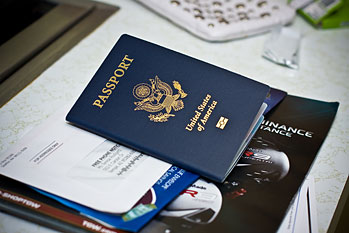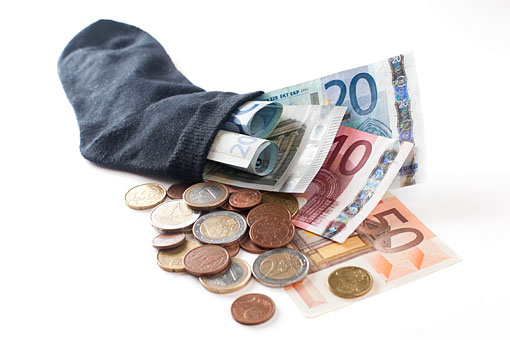
Image © Sean Hobson, used under Creative Commons Attribution 2.0 Generic license, via Flickr.com
I was excitedly booking airline tickets to Buenos Aires last week when the website prompted me to enter my passport information. “Passport… That’s in the…” But no memory came to mind easily, giving me pause as I tried in vain to recall the now distant memory of returning from my last vacation abroad in an attempt to retrace my steps or thoughts.
Misplacing things is somewhat of a routine annoyance for most of us. The experience is so common that I suspect many of us have more or less accepted that we will spend significant chunks of our lives searching for misplaced objects like mobile phones, keys, glasses, cars, etc. In these more common cases of lost objects, we typically misplace an object inadvertently. This is likely due to inattention. For example, we’re preoccupied with something else at the moment we walk in the door and are not paying attention to where we set down our keys.
These are not the types of misplaced objects I’m going to focus on, though. There is an even more frustrating subclass of misplaced objects: those misplaced as a result of intentional placement.
Misplacing intentionally placed objects sounds somewhat contradictory at first, but bear with me. What do you do with that gift card you don’t want to lose? Your spare car keys? A photograph or letter? Jewelry? Do you know where your passport is? Sometimes we put objects like these that we don’t have any need for right away in places chosen specifically so that we can find them later.
As you might imagine, it’s a bit tricky to gather data on this subject because people are understandably reluctant to tell others about their hiding places and what objects they hide there. However, there has been some relevant research, and to the extent that it is generalizable (unless people from Dallas are not representative of the rest of us), around 95% of us have hidden something before. Brown and Rahhal (1994) found that the most commonly hidden objects, in order of frequency, are: jewelry, money (e.g. cash, credit cards, checks, gift certificates, etc.), papers (passports, diaries, books, photos, letters, contracts, airline tickets, etc.), keys (spare car/house, safe deposit box, file cabinet, etc.), gifts and keepsakes (e.g. figurines, medals, etc.), and contraband (e.g. drugs, pornography, etc.). The most commonly reported reasons for hiding objects are to prevent them from being discovered by others, being stolen, or being lost. The fact that these items tend to be valuable either intrinsically (e.g. jewelry) or because the item is needed in the moment (e.g. passport, spare key) are bad enough, but because in these cases we have made deliberate efforts to store the item precisely so that we are able to retrieve it later this memory failure is an especially frustrating one. After all, we ourselves are the ones who hid the darned thing! And in the most ingenious and perfect place too!
Winograd and Soloway (1986) who were interested in these “case[s] where we are our own mnemonic enemy,” suspected that the likelihood of forgetting might have something to do with where we choose to store the items. Insofar as the motivation to hide things is to prevent them from being discovered by others or stolen, then we are drawn to seek out unlikely places for the objects.
We generally believe that greater distinctiveness affords us greater memorability.
Another reason why we might choose an unlikely place for an object is that it we generally believe that greater distinctiveness affords us greater memorability, but this is not the case in these instances. Winograd and Soloway’s participants rated unlikely places (e.g. “The jewelry is in the oven”) as more memorable than likely places (e.g. “the sales receipt is in your wallet”). However, they also found that the pattern of recall was the reverse of what would be expected. On average, 50% of the likely places were recalled compared to 30% of the unlikely places.

Image © Uros Kotnik, used courtesy of Freeimages.com
There are a two explanations from psychological research that can help us understand why this would be the case. The first is that one piece of information can serve as a link to another if the two are strongly associated in memory. To find objects hidden in special places, we would need to rely on the object to cue the location. When the location is selected because it is not the logical or expected place for the object, this doesn’t work. The second reason is that despite there not being an obvious association between the object and the place, we don’t seem to try to compensate by engaging in any deliberate efforts to create an association either. The object could potentially become associated with the location to a sufficient degree to act as a memory cue, but this would require some sort of deliberate encoding strategy such as using imagery to associate the object with the location attentive rehearsal. Winograd and Soloway found that when they asked participants to mentally hide objects in unlikely locations, participants took less time to choose the location than when they were asked to hide the objects in likely places. One of the most robust findings in memory is that the more deliberately and effortfully something is encoded to memory and the more it is rehearsed, the more likely that it will be recalled. Therefore choosing these locations quickly and not thinking about the again until the need for the object arises does not help create strong memories.
So where should you put things so that you will find them? It is probably better to stick with one or two favorite places and to use those consistently. In the case of valuable items, safe-deposit boxes are a common and preferable choice. When these are not possible, Winograd and Soloway suggest keeping a list of where things are stored so only the location of one item, the list, needs to be remembered, but caution, “Still, it would not be a good idea to store the list in an unusual location.”
In the end, my passport was located easily enough because it had fortunately not been stored in an unlikely or unexpected location.
References
- Winograd, E., & Soloway, R. M. (1986). On forgetting the locations of things stored in special places. Journal of Experimental Psychology: General, 115(4), 366–372.
- Brown, A. S., & Rahhal, T. A. (1994). Hiding valuables: a questionnaire study of mnemonically risky behavior. Applied cognitive psychology, 8(2), 141–154.











On more than one occasion, while searching for the hidden object “A”
I have stumbled across previously hidden object “B”
I’m still looking for object “A”
Very interesting article. It triggered a memory of one of our favorite family stories related to intentional placement. My father was a detective and his acute awareness of property theft meant that he looked around for places to hide valuables before traveling. When my parents moved to a very old house and the time came to look for ingenious new hiding places, he pulled back a piece of door molding — and found a stash of silver candlesticks that previous owners had hidden and forgotten many years before!
Has anyone seen my keys?
When I began reading your article I thought I wrote it; well, at least maybe shared my life story with you. I used to take important things whether I would be needing them the next day or next month and put them someplace I would not forget. I discovered the key word was forget, I would always forget. I now have special places for 70% of my, oh where did I put that, did I file it in the cabinet, in the file box but eventually retrieve it without too much looking. The other thirty percent is a crap shoot; I would usually crap out before I find it. I get frustrated and tired just looking everywhere for that one thing I need. I usually find it later when I am looking for something else that I have a 25% chance of finding. I started to thin the pile by discarding that which I have not touched in more than two years only to need it the next month and have to purchase a replacement. I am at an age and point in my life where I am going to cull the herd sharply and let someone else fix it. Well, at least that is what I keep telling myself and my wife.
Simplicity seems to work best for me. If I don’t have things that need a hiding place, there is no need to recall where these things were hidden.
For safety, I use a a safety deposit box at a bank.
I have often wondered how paper can be important. After all, it is just paper. Sure, I have treasured books, etc. but paper? Important documents should be in a safety deposit box or with an attorney.
Not doing drugs or having pornography or a hidden life greatly simplifies things. It is rather similar to having no tangled webs due to deception.
Keep it simple.
I placed a spare set of keys somewhere special about a month ago and I have been torturing myself daily about the likely location. This article has started me off again….
Because I tend NOT to lose things I find this very frustrating. If i receive an important document I often file it in an entirely appropriate place – in a filing cabinet; in the relevant folder( or a newly created one) and immediately forget about it until it is needed – I then start asking myself “where did I see that last” – eventually, after much pulling out of hair, it occurs to me that I might have filed it and voila !
I call this “Outfiling” myself.
This sounds similar to remembering passwords. Substitute accounts for objects and passwords for places. Secure passwords that are hard for hackers to guess also tend to be hard to remember. The advice in the end also applies to passwords.
1. “It is probably better to stick with one or two favorite places and to use those consistently” translates to using one or two favorite passwords for multiple accounts, which security experts usually advise against.
2. “Keeping a list of where things are stored” translates to using a password manager. But the caution that, “Still, it would not be a good idea to store the list in an unusual location” leaves you open to having everything stolen. Of course, it would suck to forget where you hid the list, or analogously to forget the master password to the password manager, but when you have just one very important item to remember, you really ought to remember it. Remind yourself every day if you have to.
I have a regular routine in the morning, but when I deviate from it, I frequently set off my alarm system going out to get the newspapers. I learned on a TV show that burglars figure out your security code by spraying something which highlights the numbers regularly used. So I started using both my regular and backup codes.
In order to prevent setting off my alarm, before I open the door I try to recall which code I used. If I can’t remember, I check the panel. So far, so good. I’ve been paying more attention when I turn off the alarm.
Great article! I used to lock my keys in the car enough to try to figure out how to avoid it. I have taught myself to be very deliberate about rolling down the window if I am getting in and out of the car, such as when placing items in the car after shopping. Also, I make myself pay attention when I am clicking the keys onto my purse so I’m not doing it on automatic pilot. These two strategies have saved me lots of aggravation the past ten years or so. Now, finding my car in a massive parking structure – that takes making a note on the parking stub.